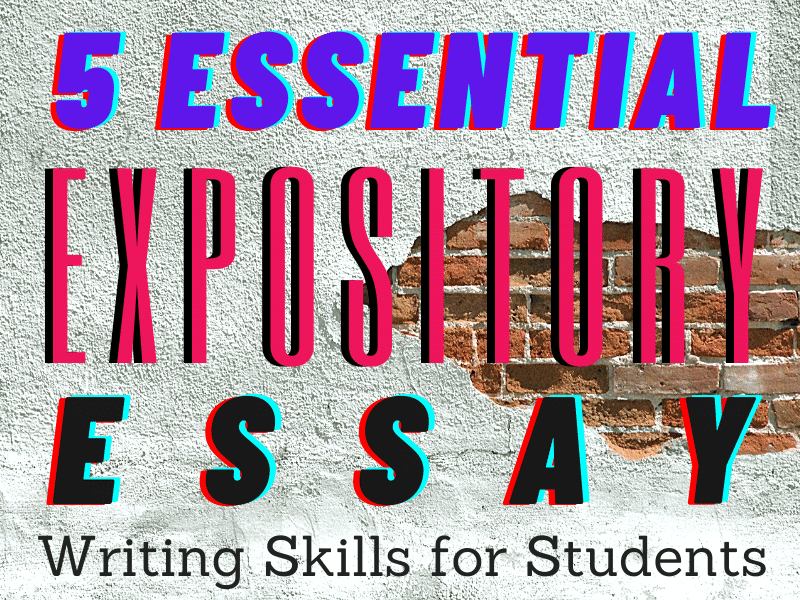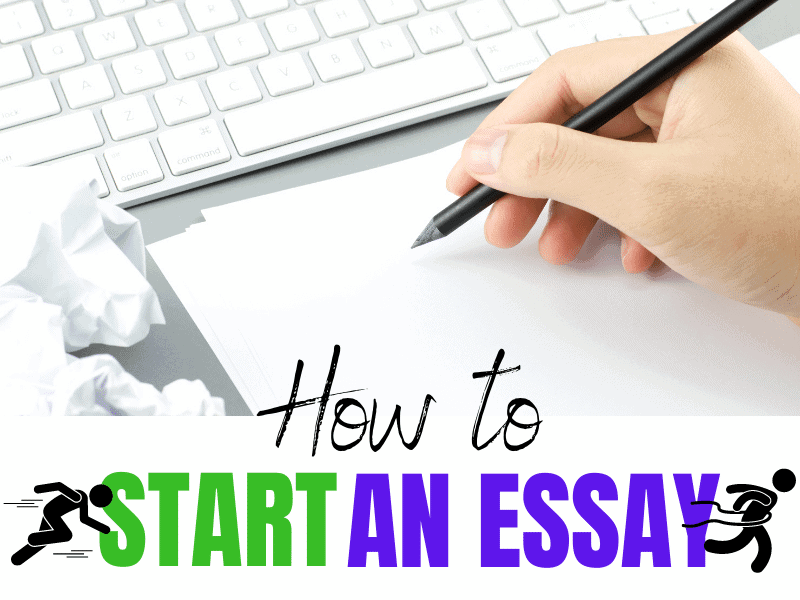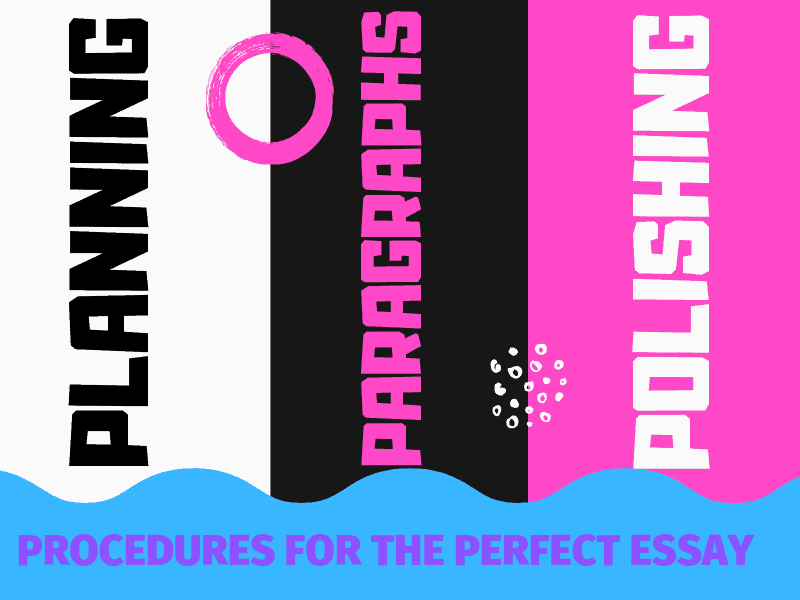Which Option Is An Example Of Expository Writing Apex

What Is an Expository Essay?
Despite their title, expository essays are arguably one of the most straightforward and systematic types of essays for students to write.
As with any text type, the best place to start is by defining clearly the genre's purpose for the student.
In the case of an expository essay, the goal is to explain a topic as logically and as straightforwardly as possible.
We have a must-read guide to expository essay writing here.
Examples of Expository Essay Titles
Expository essay prompts are usually pretty easy to spot.
They typically contain keywords that ask the student to explain something. For example, "define", "outline", "describe", or even, most directly of all, "explain".
This article will take a closer look at what exactly an expository essay is intended to accomplish and how it goes about doing this. We'll examine the structure of this type of essay and take a closer look at the primary language and stylistic features of this vital text type.
After this, we'll explore five distinct tips that will help your students get the most from writing their expository essays.
Expository Essays vs Argumentative Essays
Expository essays are often confused with their close cousin, the argumentative essay. Still, it's easy to help students distinguish between the two with a quick examination of their similarities and differences.
In an expository essay, students will attempt to write about a thing or a concept neutrally and objectively, unlike an argumentative essay where the writer's opinions permeate the text throughout. Simple as it sounds, this may take some doing for some students as it requires the writer to refine their personal voice almost out of existence!
Luckily, choosing the correct viewpoint from which to write the essay can go a long way to helping students achieve the desired objectivity. Generally, students should write their expository essays from the third-person perspective.
Contrastingly, argumentative essays are subjective in nature and will usually be written from the first-person perspective as a result.
In an expository essay, the text's prime focus is the topic at hand, rather than the writer's feelings on that topic. For the writer, disassociating their personal feelings on a topic is much easier when they're at a step removed from the narration through using the third-person POV rather than the first-person.
5 Top Expository Writing Tips
Expository Essay Writing Tip #1: Choose the Right Tool for the Job

Surprising as it may seem, not all expository essays are created equal.
In fact, there are several different types of expository essays, and our students must learn to recognize each and learn to choose the correct one for their specific needs when producing their own expository essays.
To do this, students will need to know these five different types of expository essay:
- The Cause and Effect Essay: This type of essay requires that the writer explains why something happened and what occurred due to that event and subsequent events. It explores the relationship between people, ideas, events, or things and other people, ideas, events, or things.
- The Compare and Contrast Essay: In a compare and contrast essay, the writer examines the similarities and the differences between two subjects or ideas throughout the body of the piece and usually brings things together in an analysis at the end.
- The Descriptive Essay: This is a very straightforward type of expository essay that provides a detailed description or explanation of a topic. The topic may be an event, place, person, object, or experience. This essay's direct style is balanced with the freedom afforded the writer to inject some of their own creativity into the description.
- The Problem and Solution Essay: In this type of expository essay, the student will work to find valid solutions to a specific problem or problems.
- The Process Essay: Also called a how-to essay, this essay type is similar to instruction writing, except in essay form. It provides a step-by-step breakdown of a procedure in order to teach the reader how to do something.
When choosing a specific topic to write about, students should consider several factors:
● Do they know the topic well enough to be able to explain the ins and outs of the subject to an audience unfamiliar with it?
● Do they have enough interest in this topic to sustain thorough research and writing about it?
● Is there enough relevant information and credible sources available to fuel the student's writing on this topic?
Expository Essay Writing Tip # 2: Research the Topic Thoroughly
Regardless of which type of expository essay your students are working on, they must approach the research stage of the writing process with diligence and focus. The more thorough they are at the research stage, the smoother the remainder of the writing process will be.
A common problem for students while researching is that sometimes they don't have a clear understanding of what the objective of their research is. They lack a clear focus for their efforts.
Research is not mindlessly scanning documents and scrawling occasional notes. As with any part of the writing process, it begins with determining clear objectives.
Often, students will start the research process with a broad focus and, as they continue researching, they will naturally narrow their focus as they learn more about the topic.
Take the time to help students understand that writing isn't only about expressing what we think; it's also about discovering what we think.
When researching, students should direct their efforts to the following:
- Gather Supporting Evidence: The research process is not only for uncovering the points to be made within the essay but also the evidence to support those points. The aim here is to provide an objective description or analysis of the topic; therefore, the student will need to gather relevant supporting evidence such as facts and statistics to bolster their writing. Usually, each paragraph will open with a topic sentence, and subsequent sentences in the paragraph will focus on providing a factual, statistical, and logical analysis of the paragraph's main point.
- Cite Sources: It's an essential academic skill to be able to cite sources accurately. There are several accepted methods of doing this, and you must choose a citation style appropriate to the age, abilities, and context of your students. However, whatever style you choose, students should get used to citing any sources they use in their essay either in the form of embedded quotations, endnotes, or bibliography – or all three!
- Use Credible Sources: The Internet has had as profound an impact on knowledge sharing as the Gutenberg Press did almost 600 years ago. It has provided unparalleled access to the sum total of human knowledge as never before, with each student having a dizzying number of sources available at their fingertips. However, we need to ensure our students understand that not all sources are created equal. Encourage students to seek out credible sources in their research and to filter out the more dubious sources. Some questions students can ask themselves to help determine a source's credibility include:
● Have I searched thoroughly enough to find the most relevant sources for my topic?
● Has this source been published recently? Is it still relevant?
● Has the source been peer-reviewed? Have other sources confirmed this source?
● What is the publication's reputation?
● Is the author an expert in their field?
● Is the source fact-based or opinion-based?
Expository Essay Writing Tip #3: Sketch an Outline
Every kid knows you can't find the pirate treasure without a map, and the same is true of essay writing. Using their knowledge of the essay's structure, students start whipping their research notes into shape by creating an outline for their essay.
The 5-paragraph essay or 'Hamburger' essay provides a perfect template for this.
Students start by mapping out an appealing introduction built around the main idea of their essay. Then, from their mound of research, they'll extract their most vital ideas to assign to the various body paragraphs of their text.
Finally, they'll sketch out their conclusion where they'll summarize their essay's main points and, where appropriate, make their final statement on the topic.
Expository Essay Writing Tip #4: Write a Draft
Title chosen? Check! Topic researched? Check! Outline sketched? Check!
Well, then, now it's time for the student to begin the writing in earnest by completing the first draft of their essay.
They'll already have a clear idea of the shape their essay will take from their research and outlining processes, but ensure your students allow themselves some leeway to adapt as the writing process throws up new ideas and problems.
That said, students will find it helpful to refer back to their thesis statement and their outlines to help ensure they stay on track as they work their way through the writing process towards their conclusions.
As students work their way through their drafts, encourage them to use transition words and phrases to help them move smoothly through the different sections of their essays.
Working directly from an outline, sometimes students work as if to a checklist. This can sometimes see the finished essay resembling Frankenstein. That is, an incongruous series of disparate body parts crudely stitched together.
Learning to use transitions effectively will help students create an essay that is all of a whole with all the joins and seams sanded and smoothed from view.
Expository Essay Writing Tip #5: Edit with a Fresh Pair of Eyes

Once the draft is complete, students enter the final crucial stage of editing.
But, not so hasty! Students must pencil in some time to let their drafts 'rest'. If the editing process takes place immediately after the student finishes writing their draft, they'll likely overlook much.
Editing is best done when the student has had some time to gain a fresh perspective on their work. Ideally, this means leaving the essay overnight or even over a few nights. However, practically, this isn't always possible. Usually, though, it will be possible for the student to put aside their writing for a few hours.
With the perspective that only time gives, on returning to their work, students will be able to identify areas for improvement that they may have missed. Some important areas for students to look at in the editing process include:
- Bias: Students need to remember the purpose of this essay is to present a balanced and objective description of the topic. They need to ensure they haven't let their own personal bias slip through during the writing process – an all too easy thing to do!
- Clarity: Clarity is as much a function of structure as it is of language. Students need to make sure their paragraphs are well organized and that the ideas within are expressed clearly. Where necessary, some restructuring and rewriting may be required.
- Proofread: With stylistic and structural matters taken care of, it's now time for the student to shift their focus onto matters of spelling, vocabulary choice, grammar, and punctuation. This final proofread represents the last run-through of the editing process. It's the students' final chance to catch mistakes and errors that may bias the assessor (aka You!) against the effectiveness of the piece of writing. Where the text has been word-processed, the student can enlist inbuilt spelling and grammar checkers to help, but they should also take the time to go through each line word-by-word. Automatic checkers are a helpful tool, but they are a long way from infallible, and the final judgement on a text should employ the writer's own judgement.
To Conclude
Expository essays are, relatively speaking, a straightforward affair. In following the above guidelines, and with opportunities to practice applying them, students should be able to produce well-written expository essays of their own quickly and competently.
The ability to write expository texts has lots of practical applications outside the classroom. Expository writing is a valuable skill in many fields of work, from journalism and healthcare to science and business, to name but four.
The ability to explain and describe events and processes clearly and objectively is an extremely useful skill for students to have in their repertoire. While it can seem daunting at first, it will soon become a well-oiled process.
Not only can writing expository essays help students to express their thoughts, beliefs, and ideas, but it can help them to organize their thinking too.
OTHER GREAT ARTICLES RELATED TO EXPOSITORY ESSAY WRITING TIPS

How to Start an Essay with Strong Hooks and Leads
"A good start is half the work" Old Irish Proverb HOW TO START AN ESSAY: A COMPLETE GUIDE Getting started is often the hardest part of writing an essay and it's one of the main reasons our students are prone to leaving their writing tasks to the last possible minute. But, what if we were…

Expository Essay Writing: A Complete Guide
WHAT IS EXPOSITORY ESSAY WRITING? A major clue lies in the word itself. Expository writing 'exposes' something to the reader. Though the term is sometimes used to include persuasive writing, a true expository text does not allow the writer's personal opinion to intrude into the text. An expository text aims to explain, inform, or describe…

Essay Writing: A complete guide for students and teachers
PLANNING, PARAGRAPHING, AND POLISHING: FINE-TUNING THE PERFECT ESSAY Essay writing is an essential skill for every student. Whether writing a particular type of academic essay (such as persuasive, narrative, descriptive, or expository) or a timed exam essay, the key to getting good at writing is to write. Creating opportunities for our students to engage in…

Top 5 Essay Writing Tips
The Top 5 Fundamentals of Essay Writing In this article, we are going to explore the five most important elements of writing great essays. These essay writing tips are provided for teachers and students to master the craft of essay writing in the classroom. At the end of the article, we will show you the…

How to write a Conclusion
WHAT IS A CONCLUSION? Before we learn how to write a conclusion we need to determine what a conclusion is. A conclusion is the final paragraph or paragraphs in a piece of nonfiction writing. We can find conclusions everywhere from letters and reports to persuasive essays and speeches. Conclusions perform many functions, many of which…
Content for this page has been written by Shane Mac Donnchaidh. A former principal of an international school and university English lecturer with 15 years of teaching and administration experience. Shane's latest Book the Complete Guide to Nonfiction Writing can be found here. Editing and support for this article have been provided by the literacyideas team.
Which Option Is An Example Of Expository Writing Apex
Source: https://literacyideas.com/2021-6-24-top-5-expository-essay-writing-tips/
Posted by: rawlsupocand.blogspot.com

0 Response to "Which Option Is An Example Of Expository Writing Apex"
Post a Comment